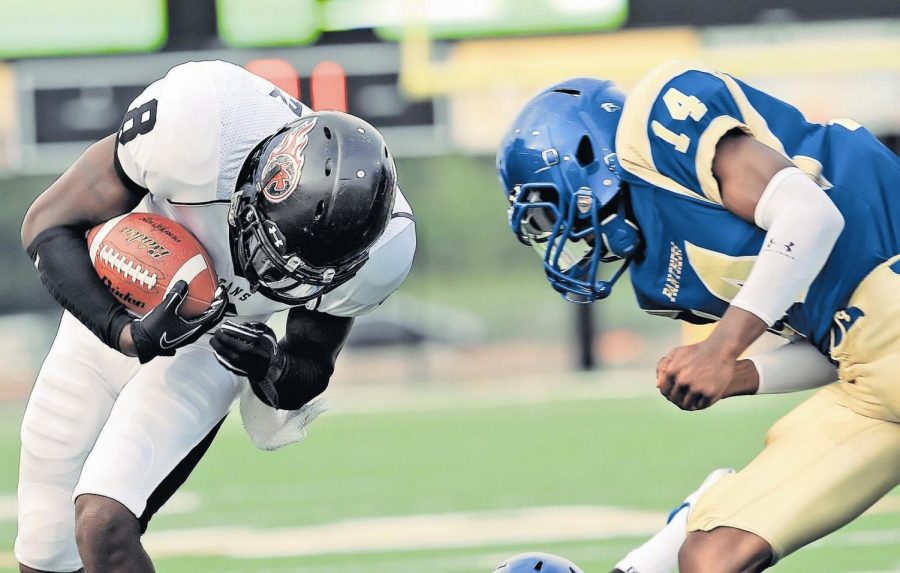Pros and Cons: Football
For some families, Sundays is all about football. Families gather at a family member’s house just to watch the game and eat (a lot). The kids watch the game and see the intensity of the player rushing into the other team’s players, tackling them to the ground. Eventually, one of the players get hit seriously hard on the head and have to be taken out of the game, most likely because of a concussion. But the kids don’t care. They want to be a part of the very popular sport. That leaves some parents a little concerned. It may be a good sport but is it safe? Is the sport really worth the risk of a major injury?
Take a look at some of the pros and cons of football:
Pro: Helps the kid stay in shape and healthy
Being in shape is very beneficial in the long run. According to the Marlow club, being active and in shape:
1. Reduces your dementia risk.
“Over the years, studies have found that staying active can boost mind function and energy, decreasing the risk of dementia. Physical activity can improve cognitive function in healthy elderly persons, and potentially reduces the risk of developing cognitive impairment”
2.Reduces stress, depression and anxiety.
“When you exercise, neurotransmitters and endorphins that ease depression are released. Plus, you raise your body temperature, which has been shown to calm nerves.”
3.Enhances mental performance and work productivity.
“Not only does exercise improve self-confidence in the workplace, which helps you take on leadership roles and perform better, but it also increases overall productivity and focus.”
Con: Football player have a high risk for concussions
Having a concussion is no joke. It can range from minor to life- threatening, and have major long term effects. A concussion is a brain injury caused by a blow to the head or a violent shaking of the head and body.
According to the Mayo Clinic: “After being struck hard check for the following symptoms: headache, confusion, lack of coordination, memory loss, nausea, vomiting, and dizziness, ringing in the ears, sleepiness, and excessive fatigue.”
The American Academy of Pediatrics recommends that you call your child’s doctor for anything more than a light bump on your child’s head.
If your child doesn’t have signs of a serious head injury, remains alert, moves normally and responds to you, the injury is probably mild and usually doesn’t need further testing.
In this case, if your child wants to nap, it’s OK to let him or her sleep. If worrisome signs develop later, seek emergency care.
Pro: Kids who play sports do better in school.
“A study published in the journal Frontiers in Human Neuroscience in August found that kids who did more aerobic exercise had more compact white matter in the brain, which is linked to better cognitive function.” (Healthnews.us)
They are more determined to do well in their studies because most schools require a certain G.P.A level in to play. The student also might want to continue playing football in college and every once in a while a college scout will attend one of their football games. They play their best and keep their grades up.
“Brain and body fitness appear to be the same thing. Research suggests that physical activity is essential for learning and retention of learned material…” (Healthnews.us)
Cons: Concussions p.2 (long term effects)
Concussions are very common and happen frequently. They can be minor as just a headache that can go away with some rest and light medicine for headaches or they can be major and have long lasting effects.
According to healthcare.utah.edu long term concussion are rare. “Only about 20 percent of people might suffer from post-concussion syndrome, where they continue to experience symptoms after six weeks.”
Symptoms of a long term concussion include: trouble concentrating, memory lost, irritability and other personality changes, sensitivity to light and noise, sleep disturbances, depression and other psychological problems and disorders of smell and taste.
“To reduce the risk of short-term problems associated with concussions from turning into long-term problems,” according to healthcare.utah.edu, “see a doctor within one to two days of a head injury, even if you or your child does not require emergency treatment.”
Balance the pros and cons
Playing football is beneficial and can be harmful at the same time. It all comes down to how much you are willing to risk. Get familiar with your coaches so they can help you when needed. Lori Cook, director of the Pediatric Brain Injury Programs at the University of Texas–Dallas’s Center for Brain Health said this:
“It is important for parents and youth coaches to arm themselves with proper concussion knowledge,” she says, “if coached and played with head safety in mind, the benefits of sports participation will likely far outweigh the risk. With proper training, equipment and putting rules in place to protect young athletes, we can make all sports safer.”

Hey, my name is Kristha Zapata-Palacios. I am a Senior in the Marine Technologies Academy. I play Flag Football (#6) and I’m a 2 year varsity cheerleader....



EZ • Sep 3, 2023 at 12:51 pm
I love this article very interesting and helping me convince my parents to let me play
Mr. Baker • Sep 28, 2018 at 3:04 pm
Great article!!!
Peter Goldstein • Sep 27, 2018 at 9:36 am
excellent article